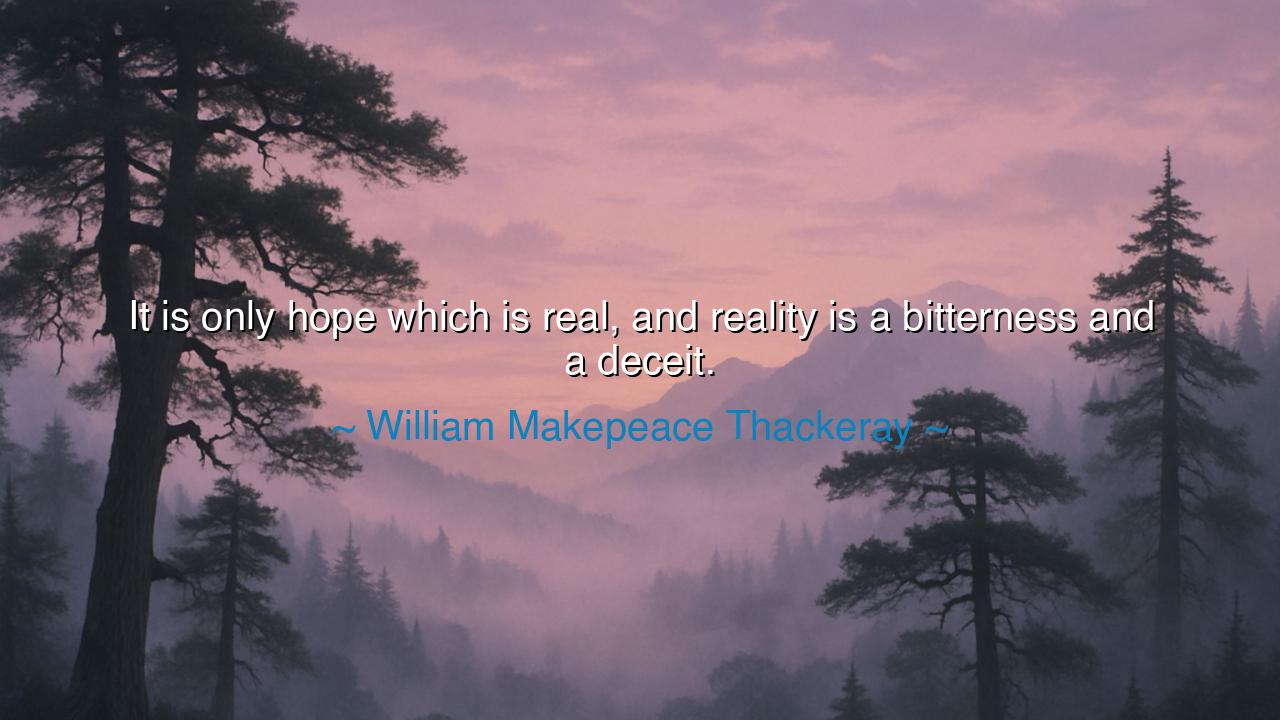
It is only hope which is real, and reality is a bitterness and a






The words of William Makepeace Thackeray—“It is only hope which is real, and reality is a bitterness and a deceit”—rise from the depths of a soul that has seen both splendor and sorrow, both the beauty of dreams and the cruelty of life. Thackeray, master of irony and human truth, speaks here not as a cynic, but as a seer. He reveals the ancient paradox that has haunted poets and prophets alike: that what sustains mankind is not the reality of what is, but the hope of what might yet be. In this brief, haunting sentence, he captures the eternal struggle between the coldness of fact and the warmth of faith—between the world as it is and the world as we yearn for it to become.
In calling reality a bitterness and a deceit, Thackeray does not curse the earth, but unmasks it. He reminds us that the world, with all its glitter and power, often disguises truth beneath illusion. The rich grow empty in their abundance; the powerful tremble within their thrones. Reality offers the appearance of stability, yet beneath it lies impermanence—death, betrayal, and loss. To those who have looked long upon the face of worldly success, reality reveals itself as fleeting shadow. And thus, to Thackeray, hope becomes the only true light, for it alone transcends circumstance. It is not bound by what is; it reaches instead toward what could be.
In the ancient days, the philosopher Plato taught that the world we touch and see is but an imitation of a higher truth—a dim reflection of the eternal and divine. Thackeray’s insight belongs to this same lineage of thought. Reality, with all its laws and limits, is but a temporary stage; hope, by contrast, springs from the immortal part of us. Hope is the vision of the unseen good, the whisper of eternity within the mortal heart. When men despair, it is hope that keeps their souls alive; when kingdoms fall, it is hope that rebuilds them. Hope is not fantasy—it is the spirit’s memory of what truth once was and must become again.
Consider the story of Victor Frankl, the physician who endured the horrors of the concentration camps in the twentieth century. Stripped of family, freedom, and dignity, he found that only one power remained—the power to hope. Those who surrendered that power died long before their bodies fell. But those who kept hope alive, even in silence, found meaning in their suffering, and strength in their endurance. In this, we see Thackeray’s meaning made flesh: reality was bitter and deceitful, filled with cruelty and despair; yet hope alone remained real, for it was the one thing that could not be taken away.
There is also a deeper lesson hidden within Thackeray’s lament. He does not tell us to despise reality, but to see through it. Life will deceive us if we mistake its appearances for truth—if we believe wealth brings peace, or that power ensures safety, or that beauty ensures love. These are the deceits of the world, and all who worship them are left empty. But he who holds to hope, not as illusion but as purpose, gains a truer sight. For hope transforms the heart—it turns bitterness into endurance, and deceit into wisdom. It is the bridge from despair to redemption.
To the ancients, hope was not a passive wish, but an act of defiance. The Greeks personified it as Elpis, the spirit that remained when all other gifts had fled from Pandora’s jar. It was hope that refused to die when the world was broken. So too must we learn that to hope is not to escape reality, but to redeem it. The hopeful man is not blind—he sees the bitterness clearly, yet chooses to walk toward light. He does not deny deceit, but turns it into resolve. In him, hope becomes not illusion, but the highest truth of the soul.
Let this be the teaching carried forward: do not worship reality, for it is fleeting; cherish hope, for it is eternal. When the world grows dark, guard the small flame within you, for that flame is the only real thing left. It is the seed of all rebirth, the foundation of all change. Remember always that every great deed was once only hope in the mind of a dreamer, and every truth began as faith in the heart of one who refused despair.
So, O seeker of wisdom, when reality wounds you, when life betrays you, do not curse it—see beyond it. Let the bitterness become your teacher, and let hope be your guide. For the world will always deceive, but hope will always reveal. And in the end, it is not what you have seen, but what you have believed in, that will prove most real.






AAdministratorAdministrator
Welcome, honored guests. Please leave a comment, we will respond soon